How To Make Money On Udemy? (Complete Guide)
 Platform Review
Platform Review

Learn from an experienced Udemy instructor how to make money on Udemy, and earn a consistent income on the platform.
So you are an online course creator and want to learn how to make money on Udemy and online course marketplaces in general?
I'm a Udemy instructor myself, and I would love to teach you everything that I have learned over the years about what works (or doesn't) on the platform.
I’ve been teaching on Udemy since 2016, and I’ve made a decent amount of income on the platform:
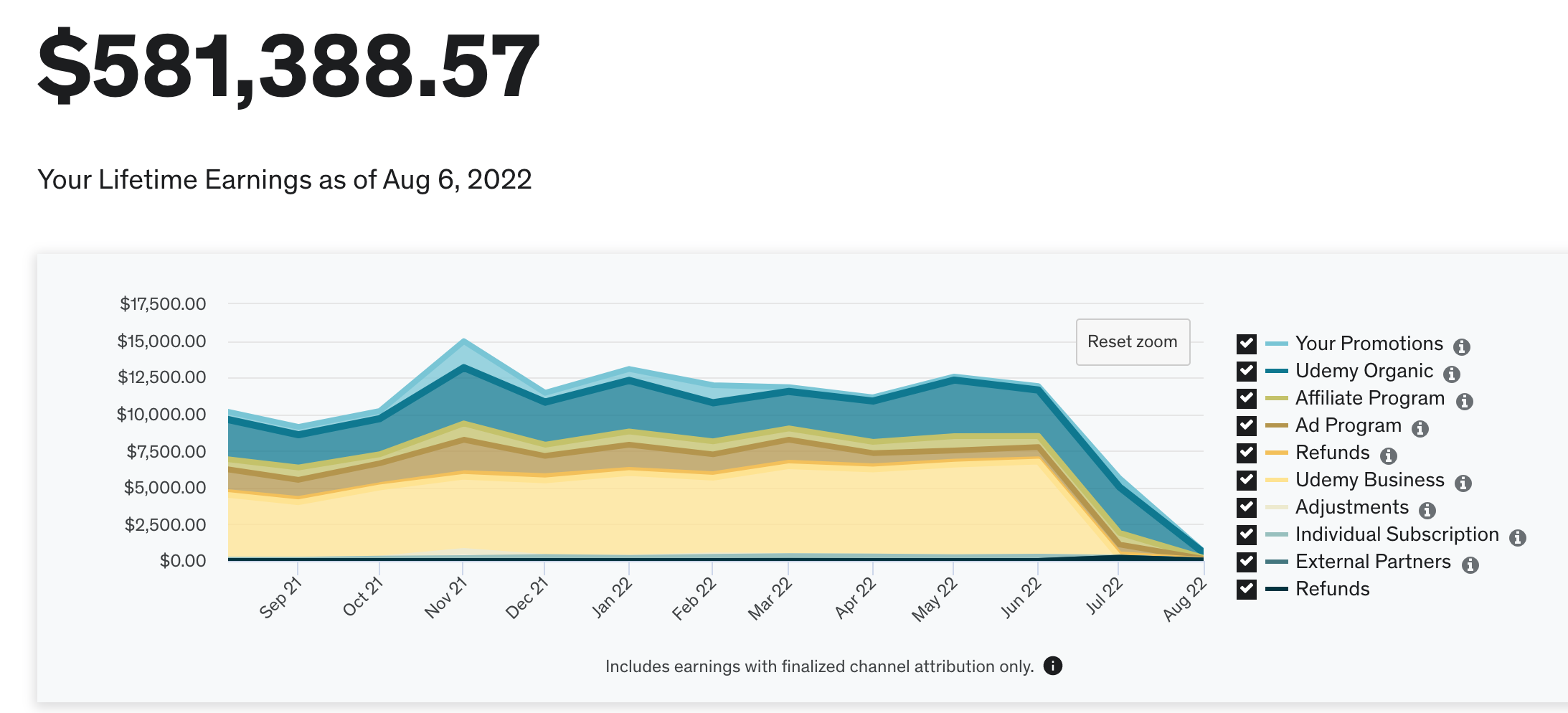
Udemy is by far one of the best online course marketplaces to start earning an income as a course creator. Nearly 50 million students take courses every month on the platform.
Over the years, I tried many strategies, some of which worked and others didn't. I also paid attention to what a lot of other instructors are doing on the platform, and took note of what works and what doesn't.
So this post is a compilation of all those Udemy tips that I've learned over the years, either through my own trial and error, or by studying what other instructors are doing.
The tips are ordered by order of importance, but all of them are relevant and helpful, so I encourage you to read them all.
These are, as far as I know, the best tips for making money on Udemy that are available anywhere on the Internet, and are the result of years of first-hand experience on the platform, so I hope you will enjoy them.
Notice that I won't be providing here any generic advice such as how to build a YouTube channel, build a blog, grow an email list, create a community, etc.
All those things help a lot and are very relevant, but I want to focus in this post on Udemy-specific tips only.
So, in summary, how to sell courses on Udemy?
Here are the best strategies that are working right now:
- Tip 1: Create Masterclass courses
- Tip 2: Create detailed courses on subtopics
- Tip 3: Conduct in-depth topic research
- Tip 4: Validate the course idea before recording it
- Tip 5: Use the Udemy Insights Analytics Tool
- Tip 6: Join the Udemy Deals Agreement
- Tip 7: Create courses for Udemy For Business
- Tip 8: Promote Your Courses Outside of Udemy
- Tip 9: Use Udemy Email Announcements
- Tip 10: Leverage The Udemy Instructor Academy
- Tip 11: Write Powerful Landing Page Copy
- Tip 12: Create a Free Course
- Tip 13: Focus On Only One Niche
- Tip 14: Improve Your Courses
Let's now get into the details of each of these tips.
So without further ado, let's dive right in. 😉
You can also check out all the free guides that you have available here at the Course Creator Academy by clicking on the Academy link on the top menu bar.
Here are other Udemy-related posts that you might be interested in:
- Is Udemy Worth It For Instructors? (Instructor Opinion)
- How Much Do Udemy Instructors Make? (See the Revenue of 13 Instructors)
- Udemy vs Skillshare for Online Course Creators
- How to be Successful on Udemy
- Udemy Alternatives (For Selling Online Courses)
Tip 1: Create Masterclass Courses
This is by far the most important tip I have to give you.
Based on what I've seen over the years, the best way to sell on Udemy is to launch masterclass courses.
These are in-depth, super detailed, long-form courses of typically at least 15 hours, and usually well over 20h.
Let me show you how and why these courses work so well, by using the Udemy Insights analytics tool that helps course creators validate topics for new courses.
For example, check out the top monthly revenue of a popular programming niche called “Python” on Udemy.
Don't worry if you don't know what this technology is, it's just an example of a popular course category on the platform:
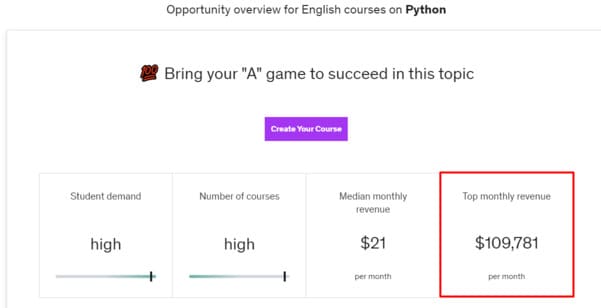
A top course in this niche can make more than $100k per month!
Now, check out the top earning courses for the same niche:
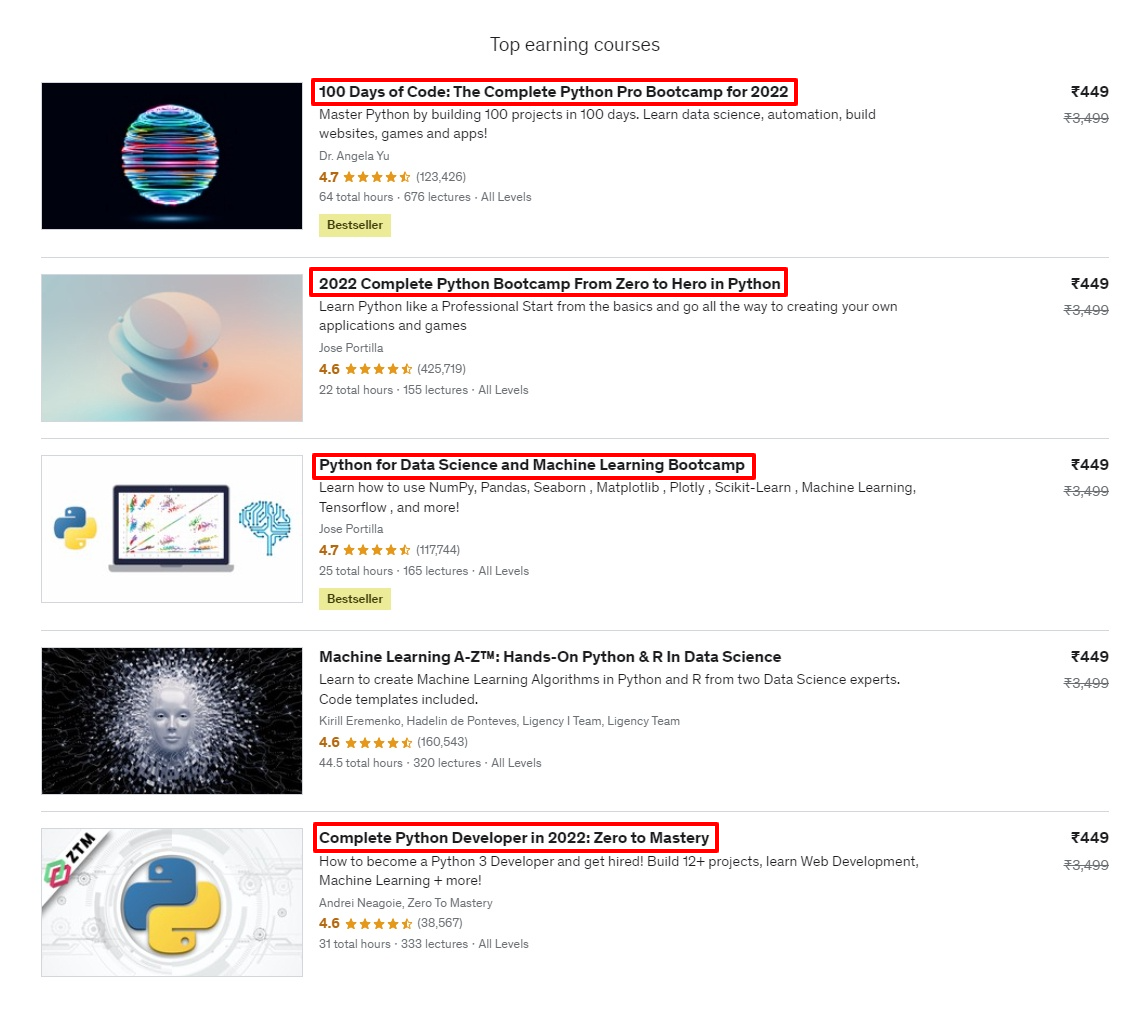
Notice that all of them are bootcamps, meaning masterclass courses, with durations ranging anywhere from 20h to over 60h.
This is the rough equivalent of an entire semester of classes, if you would take this in a traditional learning environment.
Notice that this dominance of masterclasses is not specific to this course category, as the same applies to most other course categories on Udemy.
Why do masterclasses do so well on Udemy?
Concerning this particular category, check out the current bestseller (and top-ranking) course with 60+ hours of content.

As you can see, it's a massive course that must have taken months to produce, even if working on it full time.
It contains everything that you need to learn to truly master the topic, and takes you all the way from beginner to advanced.
This course includes the theory part which is discussed in depth, and then it contains a whole series of practical projects that will allow you to apply what you have learned.
This course covers not only the main topic which is the programming language itself, but many of the surrounding subtopics like tools, libraries, etc.
You can see why this type of course does so well with students: masterclasses contain everything students need under a single package.
A student buys only one course on the subject, and they are all set; they don't need anything else! This is precisely what students are looking for.
As you can imagine, the landing page for this course converts very well, leading to more signups and more reviews, which feed into the process of making this the most popular course on the category.
Why masterclasses are more likely to be promoted by the platform
Udemy runs email marketing campaigns, and it also runs paid ads on certain courses, to try to create more purchases and bring new customers to the platform.
Naturally, Udemy prefers to run ads and email campaigns on masterclass courses, simply because they convert so much better.
Chances are, most of the popular niches on Udemy already have multiple masterclass courses. But maybe there is only 2 or 3 masterclasses, so there might still be room for another one.
If you’re lucky to find a less competitive niche with no masterclasses or beginner courses, you should immediately launch one and see how it does.
Especially if the topic is brand new and popular on a platform on Udemy, you should jump to the opportunity of creating a new masterclass on it.
This will be of course a ton of work, but it's the best way instructors are making the most revenue on the platform, from what I've seen throughout the years.
Having said all this, building masterclasses is not how I made my revenue on Udemy.
Tip 2: Create detailed courses on subtopics
This is the second best tip I can give you on how to make money on Udemy, and it's the one I used.
It's not as good as masterclasses, but it might be a better fit for you and your business.
With this strategy, instead of creating only a few masterclass courses, you are going to niche down and target either a specific sub-audience or a specific subtopic.
The typical example of courses that target sub-audiences are beginner or advanced courses, and subtopics could be anything inside your main topic that a lot of people are looking for specifically.
So why would you want to use this alternative strategy, instead of going for masterclasses only?
Let me give you an example.
Because Udemy is such a popular platform, it's extremely competitive.
Many established course creators have already launched masterclasses in the most popular niches.
Take Java (the programming language) for example. It's another popular topic on Udemy and you can see that many of the top-ranking courses are masterclasses:
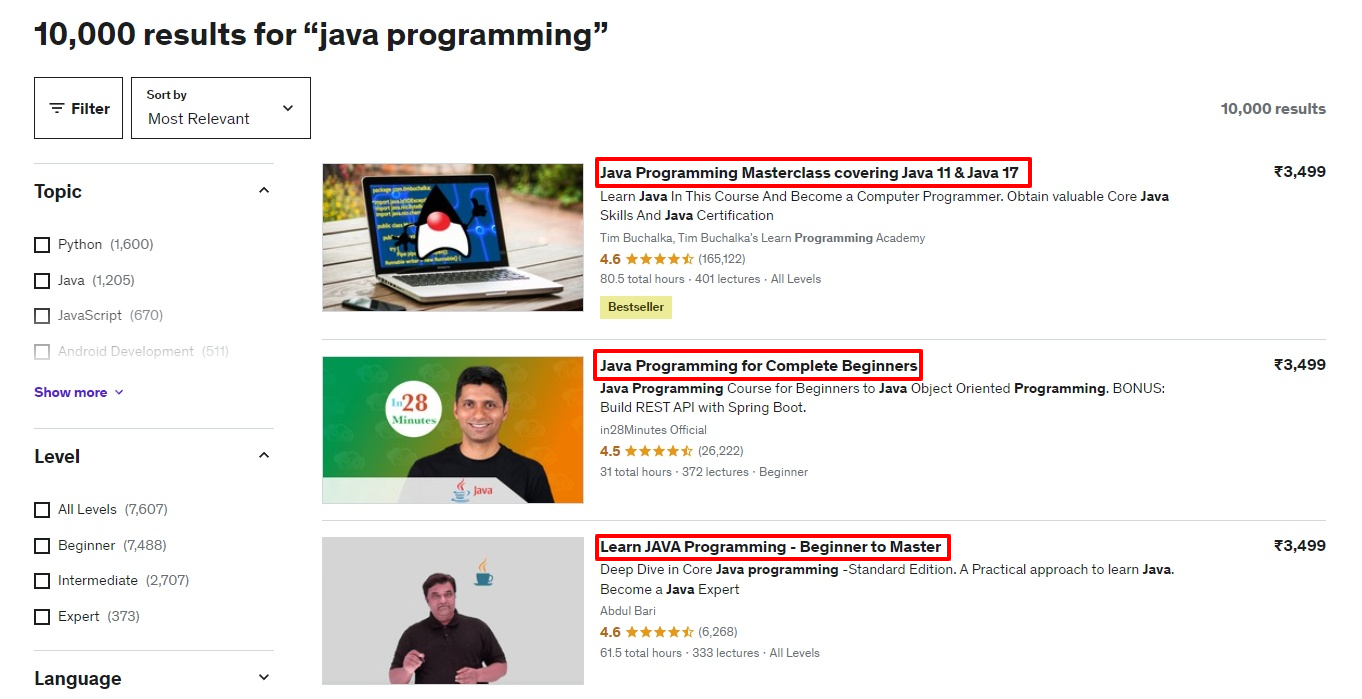
These are courses by established creators with lots of social proof and reviews. And you'll find similar beginner courses up to page 9.
So, if you launch another masterclass course, and don't do any external promotion to bring an existing audience to the platform, chances are your course will be lost o on these search pages.
You'll likely only make a few sales, because the students are going to enroll in the top-ranking posts with all the social proof.
But notice that one of the most popular courses, in fact the second most popular course is not a masterclass!
It's still 31 hours long, but it's not an all-encompassing all-in-one course, covering the main topic and many related subtopics.
Instead, it's a much more specific course aimed at beginners only. Beginners are the best segment to target with a specific course, because most people learning any topic are still beginners.
As you can see, this type of course also does very well on the platform.
So if you don't have the time to build a full-blown masterclass on a given topic, or if there are already too many masterclasses, try to find a subtopic that is still broad enough to have a large enough audience searching for that subtopic specifically.
You can apply this to several subtopics of your broader topic, and launch multiple subcategory courses, and this way you can still attract many students.
How to sell my course on Udemy: My strategy
I've used this second strategy, which worked great for me. I've talked about how I made my revenue on Udemy in detail in this post: How to be Successful on Udemy.
In summary, I noticed that my niche (software development) was already very competitive when I started creating courses.
So I decided to niche down and launched multiple detailed courses on subtopics I know well. You can check out my profile on Udemy here.
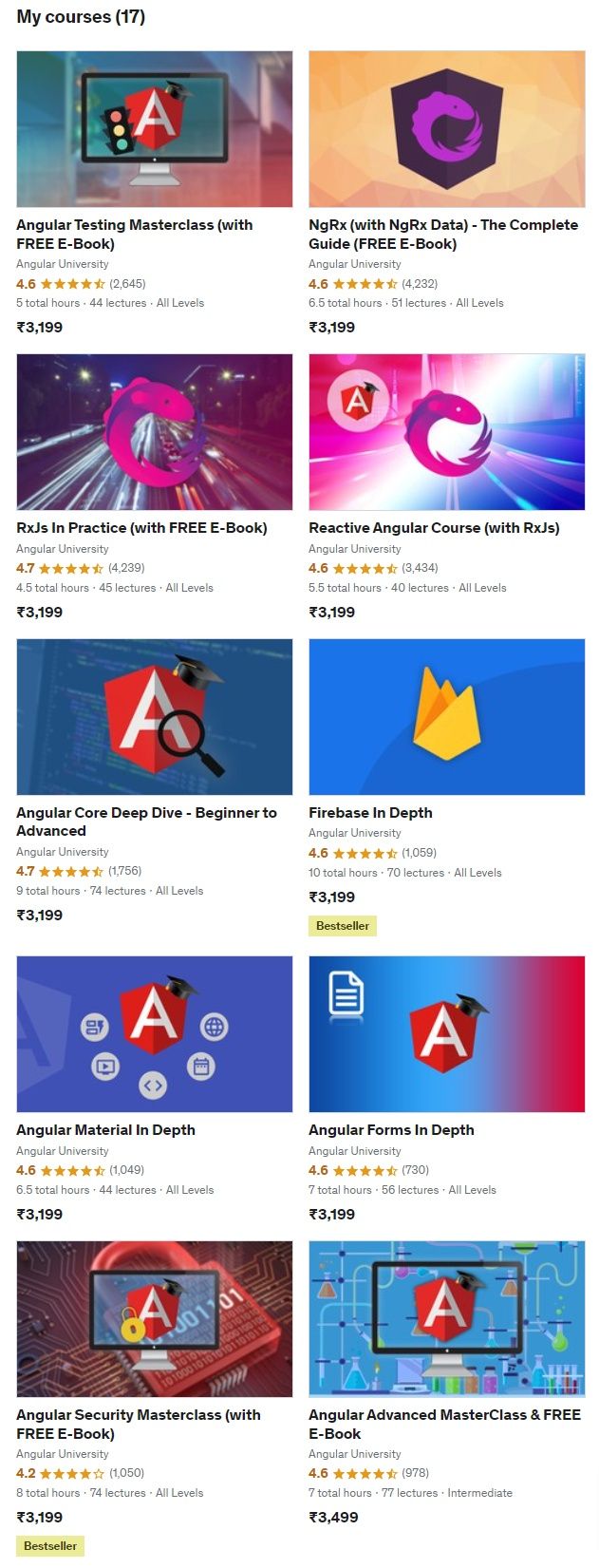
This strategy, although the second best thing when compared to masterclasses, also works very well on Udemy.
This has allowed me to generate a six-figure Udemy income in an extremely competitive niche (my topic is on the percentile 99% of popularity on Udemy), without having a single masterclass.
Who do smaller courses appeal to?
In fact, I prefer to create these smaller and more focused courses, that appeal to a more advanced audience that is looking to get more information only about one particular subtopic, and nothing more.
As you can imagine, there are many students on the platform that are not looking for a 30h-long course, as they don't have the time for it.
These students want something shorter and much more specific that they can take in a day or so, not weeks or months.
So this is the subset of the platform audience that my courses serve, and you too could apply the same strategy if you see that your topic is already too crowded with masterclasses.
Also, another argument for building many smaller and more specific courses, is that this means potentially more sales per student over time, more on this on tip 13.
Tip 3: Conduct in-depth topic research
I was hesitant to put this tip in number one instead of number 3, but I thought understanding the difference between masterclasses and niche courses was more important to start with.
But this tip is also crucial. To sell a course on Udemy, you need to research properly. And this is because if you don't do your initial research properly before launching a course, you risk:
- spending months producing a masterclass for a topic that has nearly no audience
- or worst create a course that is not as good as the ones already available, and end up buried in the rankings with very little revenue to show for
Whether or not you go with masterclass courses, your goal should always be to launch a valuable course, that a sizeable audience is actually looking for.
Ideally, a course better than the current top-ranking courses: more in-depth, more engaging, with more practical exercises, etc.
Udemy is a competitive platform and even if your niche isn’t competitive it will become so in the upcoming years.
To launch better courses than the existing ones, you have to first conduct in-depth topic research before even start recording your course - this research could take days if necessary, but usually it takes less than that.
Start by checking the courses on your topic, and try to find what they missed or didn’t explain well.
For example, if I were to make an online course to teach "how to draw eyes" then I would do a quick Udemy search:
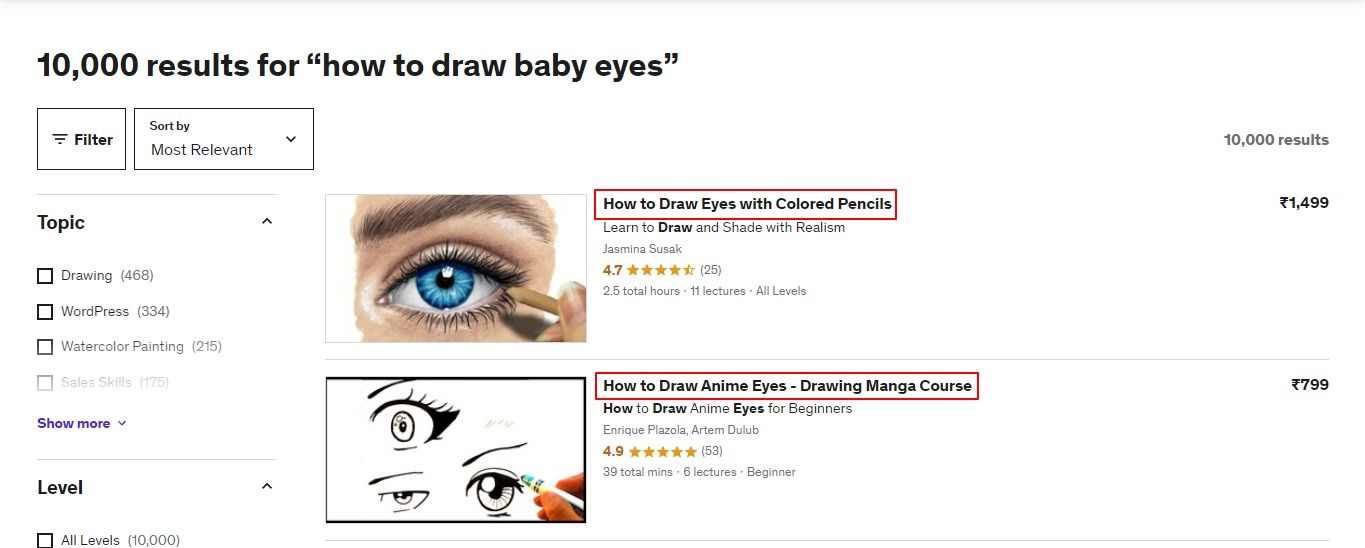
I'll go through each course's landing page, outline, and student reviews to find faults or gaps. For example, I was going through student reviews and this one caught my attention.
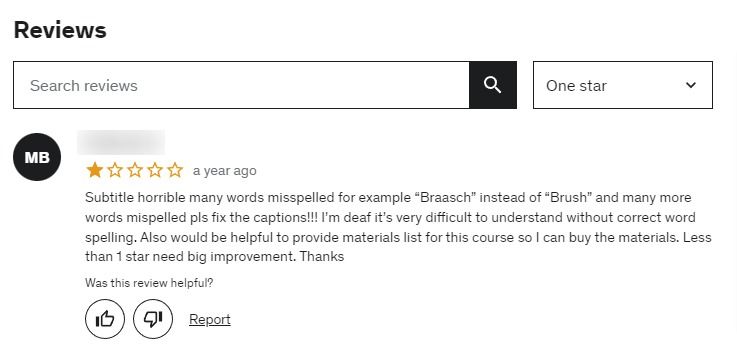
I think the part on subtitles we can't use, I think the reader means the auto-generated subtitles.
But later in the review, I found a very simple and actionable tip for creating a better course: Simply include a PDF with a list of materials for students to buy.
Similarly, you should go through the top-ranking courses to find issues and make sure your course doesn't have similar problems.
Besides doing in-depth research on what to include or not in the course, you should also validate the idea itself, to see if it's commercially valid.
Tip 4: Validate the course idea before recording it
If you remember Tip 2, I told you to consider creating courses on subtopics of your course category, if the category is too crowded.
But be careful with this strategy, as it can backfire on you!
This is because many times when niching down, you might end up with course topics that no one wants to buy.
There is a risk that you niche down too much, to the point where hardly anyone is looking for a course like that.
Therefore, before you think about how to sell on Udemy, it’s always good to validate the idea first. That is to see if it's commercially viable or not.
Here are a few ways to validate a course idea:
- Join groups on your niche and participate in conversations, to better understand your audience. The best sources are usually subreddits, Quora and Facebook groups
- Ask questions related to your course topic and find out if people are really looking to learn about it.
- Create polls and ask directly if your audience would like to learn what you’re going to teach in your new course.
If you collect enough feedback and at least some people show interest, it's a very good sign that your course is worth creating.
Tip 5: Use the Udemy Insights Analytics Tool
To simplify a lot your research, use the Udemy insights tool.
Udemy provides for free the marketplace insights tool to all its instructors, to help them conduct research.
And remember, joining Udemy as an instructor is free and there is no approval process, so you can use this tool even before launching your first course.
But why use it? Because you'll get credible data directly from Udemy.
To access the tool you need an instructor account.
Once you open the Insights tool, just type in your course category.
Let's suppose that I want to create a fitness course:

When I scroll down, I'll get insights for this course idea.

The report says that the course demand is high but so is the number of courses.
So, it might not be an easy course idea for me to start with. But then again, we can always go for the niche courses approach.
Or instead, just find a less competitive sub-topic.
Keep trying new ideas until ideally you find something that is a bit less competitive, high in demand, and will make good monthly revenue.
If you don't find your course category on the Insights tool yet, that is not necessarily a bad sign.
This might simply mean that it's a new topic and no one has created a course yet on it, so you could be the first to do it.
Tip 6: Join the Udemy Deals Agreement
Wondering how to sell Udemy courses on autopilot?
To boost your income on Udemy and improve your course rankings, joining the Udemy Deals agreement can be a great help.
But first, what is the Udemy deals agreement? Here is how it works.
Udemy runs multiple promotional sales every month. In which it promotes instructors' courses at a discounted price (like for example $9.99, $11.99, etc.).
So if you are part of the Udemy Deals program, Udemy will promote your courses at a discounted price, which you might feel is a bit low (new higher prices are being tested all the time).
So you might be tempted to leave the Udemy Deals program because of that. My advice to you is: don't.
Because joining these site-wide promotions can help a lot of your courses do better in the long run.
If Udemy promotes your courses to its massive audience (49 million+ on the platform, email list, social media, ad campaigns, etc), you can be sure to convert many visitors into students.
If they like your courses, chances are they will buy again from you in the future. In the long run, this helps you build much more social proof such as student enrollments, reviews, etc.
This extra social proof will also help your courses convert better over time, leading to more revenue, etc.
So, how do you join the Udemy Deals program?
When you sign up as a premium instructor on Udemy, you’ve already opted in for the program by default.
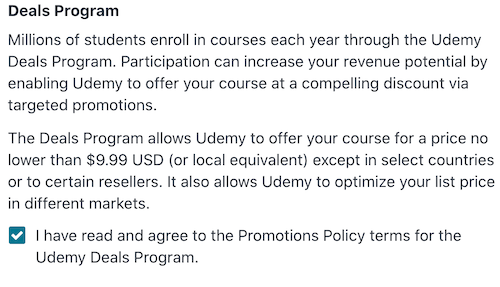
But as I have mentioned, I wouldn't turn this off if I were you. Personally, I have this option on.
If you have accidentally turned it off or you are not sure if you are part of the program, you can check this on Profile > Payout Settings > Manage Promotional Agreements > Udemy Deals Program.
Notice that opting out of the Udemy Deals program means that Udemy will not include your courses in its promotional activities anymore, like paid ads or email marketing.
Notice that those Ads are paid by Udemy, and not by you.
So if you opt out of the Udemy deals program, you are not just opting out of the discounted prices and the site-wide promotions.
You are also opting out of any of the promotional activities that Udemy does for your course.
This is because without those discounted prices, it's very unlikely that those paid promotions would be cost-effective.
So if you do opt-out, you'll be solely dependent on your marketing efforts, and on the organic results that you get from the platform, which include search and suggested courses.
In the short term, a discounted sale like this might not seem like a big amount to earn.
But almost all sales on Udemy are discounted anyway, so I think it's better to join the Deals program. This way you will get many more students, which is priceless.
So my tip is, don't opt-out of Udemy Deals, and let Udemy help you build that social proof and give you some extra sales and students.
Tip 7: Create courses for Udemy For Business
This one is a huge one right now, make it a top priority to apply this tip if you can.
Udemy For Business used to be only a tiny part of my revenue, but not anymore.
Right now, the biggest portion of my Udemy income comes from Udemy For Business, which is a subscription-based service for companies that want to train their employees:
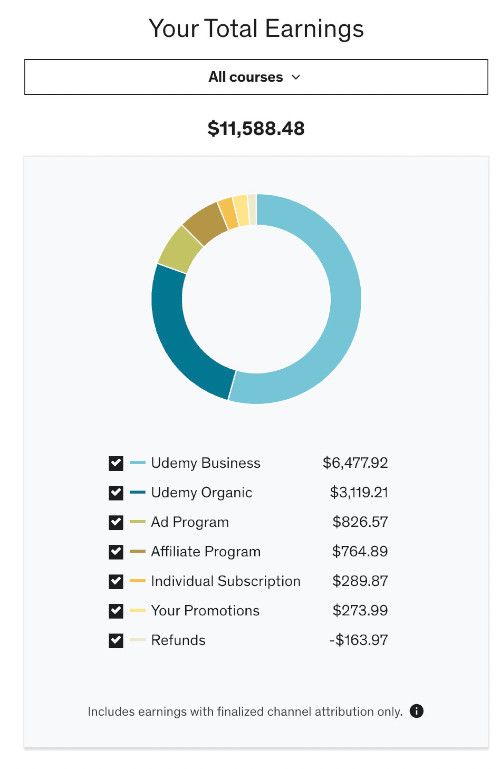
Udemy For Business has grown more and more over time, and it keeps growing, as Udemy is investing a lot in it.
For a while, I made the mistake of having my courses outside of Udemy For Business, as I had them published on other marketplaces.
You see, that is the main catch: Udemy For Business requires marketplace exclusivity (but you can still self-publish on your own website).
Initially, I was publishing my courses on multiple other marketplace platforms.
But the issue for me was that I was making pennies on those other platforms compared to Udemy, because I teach programming classes.
So I just unpublished my courses from those other marketplaces and joined Udemy For Business, which was one of the best choices I ever made on the platform.
How Does Udemy For Business work?
Companies that join Udemy For Business get access to a subset of all courses on Udemy. This is a high-quality, enterprise-friendly catalog of courses that are manually curated.
If your courses get accepted in this Udemy For Business course catalog, you get paid for the number of minutes played.
How to join Udemy For Business?
If you can, try to write company-friendly courses, on topics that companies would like to train their employees on.
For example, a course on Tennis or Astrology will likely not get included in the Udemy For Business catalog.
These courses might still do well in terms of organic results, but if you have an option do go for a course that is company-friendly, then do so.
So, how to get your courses on the “Udemy Business” catalog?
Just like the Udemy deal program, you are by default already opted-in when you sign up as a premium instructor:
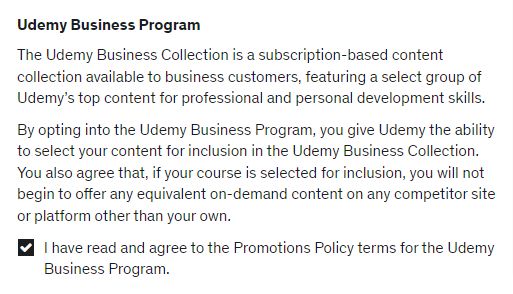
But that doesn't mean your courses will be included in the subscription program, it only means that they are eligible to be included.
You will have to wait for Udemy to include them.
So my tip is in general to not opt out of Udemy For Business even if your courses are not yet in there, as they might be added in the future if they start doing well organically.
I recommend this just because the earning potential is just so high right now.
If you are publishing your courses on Udemy, I think you have to consider Udemy For Business as well.
But this only applies if your courses are on a popular, company-friendly category, and you think that your courses have a high chance of getting included in Udemy For Business in the future.
If on the other hand your courses have the potential to do well on many other platforms, then putting them exclusively on Udemy For Business might not be the best option for you.
This decision needs to be taken on a case-by-case, course-by-course basis and you might have to try things out for a while like I did, to see what works best for you.
Notice that you can opt in or out of Udemy For Business on a per-course basis.
Tip 8: Promote Your Courses Outside of Udemy
The only two ways to get your courses promoted by Udemy are the Udemy Deals program, and via organic search and suggestions.
But joining Udemy Deals does not mean that Udemy will promote your courses with paid ads.
First, you'll have to get some social proof, which takes time.
There’s no guarantee that Udemy will promote your courses, it only means that your courses are eligible for that.
So, in the beginning, you'll be doing most of the promotion yourself, which is a good idea anyway.
Be aware that if you don't, and there are already a lot of courses in your topic, it's unlikely that your courses will do well.
If you want Udemy to pick up your courses for further promotion, you'll have to get the first few students yourself.
So, how will you promote your courses outside of Udemy?
- The best way is via a YouTube channel (it's what many of the top instructors do)
- Another way is via a blog
- Use discount coupons to share on social media
- Share the course with your email list
- Answer questions on Quora, and link to your website or course
- Share on relevant Facebook groups if allowed, or create your own Facebook group
- Answer relevant Reddit threads
I know many of these things take a ton of work, but these are the most effective ways to promote your course outside of Udemy.
It's great to be able to count on Udemy to do some of the promotional effort.
But the more you take care of the promotion effort yourself, the better your courses will do on Udemy, and the more the platform will invest in them by running paid ads and email marketing campaigns on your courses.
Tip 9: Use Udemy Email Announcements
To let instructors interact with their students, Udemy allows them to send email announcements.
You can send two types of emails:
- Educational: You can only send educational content. In other words, no promotions are allowed.
- Promotional: You can use these emails to send discount coupons to your students.
You can send up to 4 educational emails and 2 promotional emails in a month.
But if you use all of them every single month, it might be a bit too much.
Your audience might get annoyed or start unsubscribing, which will reduce the effectiveness of future promotions.
You must leverage these emails strategically to make more sales. Here's how I personally prefer to use these emails:
- I send no more than one email a week, most of the time an educational email only.
- I send a link to a YouTube video, or some other hosting service like Vimeo. The video is a sample lesson from the course I'm currently working on, this way the students get to know the course before launch.
- I send much more educational content than promotional coupons.
- I send promotional coupons only on major sales like Black Friday, New Year, etc., as well as on course launches
This way, most of my emails are educational. I'm either sending free sample lessons of an upcoming course, or promoting existing courses on special occasions.
My promotional emails are sent only rarely, and not all the time (twice a month). I see some instructors doing that, but I don't think it works great.
If you do that, your students will likely get promotion fatigue and they will start ignoring your promotional emails altogether.
Or worse, when they are ready to buy on a Black Friday, they won't even receive your email because they have unsubscribed in one of your previous promotions.
As an example, I made $871 on the 2020 Black Friday sale with only one email:
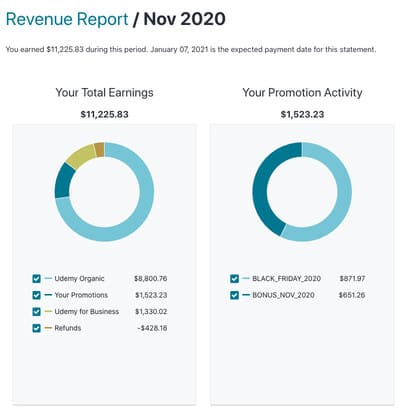
Tip 10: Leverage The Udemy Instructor Academy
One of the best places to learn advanced Udemy strategies is the Udemy instructor academy.
You're welcome to join the Academy as soon as you create an instructor account.
The best part? You can ask questions and get Udemy experts' answers.
You'll be shown the "go-to solution" for already asked questions. For example, check out this answer by a Community Champion who is also an expert Udemy instructor.
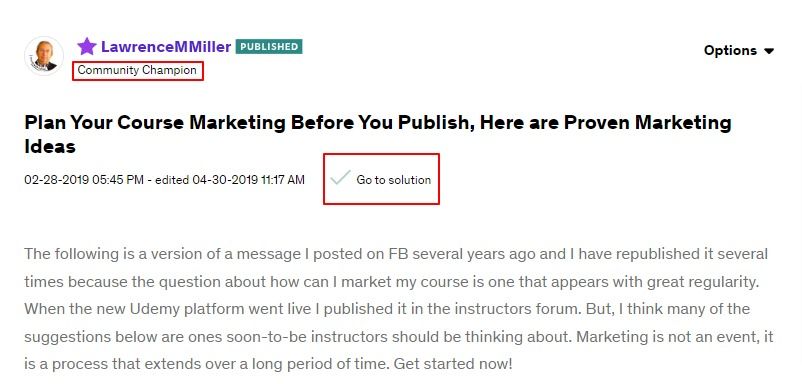
If your question isn't asked before you can put it forward, the community is active and one of the experts will respond to your question soon.
You'll notice that experts frequently share the strategies that helped them increase revenue. Like this one.
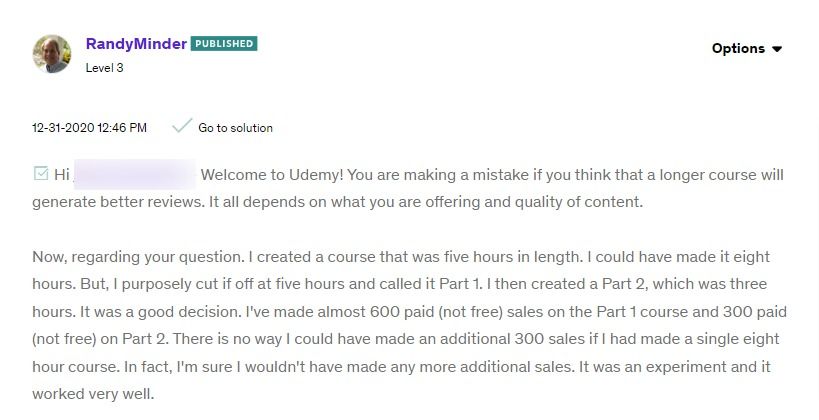
By being active in the community, you'll be able to learn from other instructors, and scale your income faster.
Tip 11: Write Powerful Landing Page Copy
The course landing page is super important, as it's the thing that determines your conversion rate, meaning if the student will buy your course or not.
That’s why you should take your time to write your landing page copy, and really think it through.
The course landing page editing window on Udemy is designed in a way that you only need to add some text and a thumbnail:
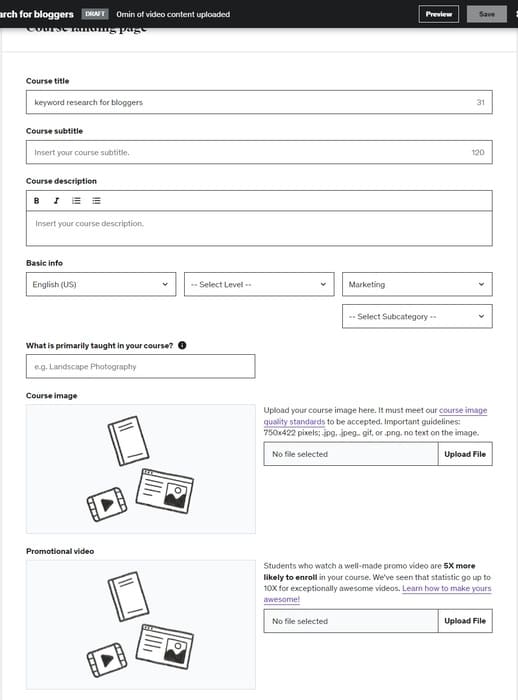
Just focus on crafting a clear message that includes these things:
- Benefits of your course
- Who is it for?
- What problem does it solve?
- What exactly will your students learn in the course?
- How exactly will your students develop the skills taught in the course?
Other than that, put extra effort into the course title, get a professionally designed thumbnail, and add a preview video.
Make these things attention-grabbing.
You can also describe the benefits of your course. For example, this course title caught my eye immediately:

It clearly states the benefit (the students will learn how to automate tasks) and uses a power word (Boring) to make it stand out.
You should also optimize your course landing page with the right keywords.
Louise Croft, a 6 figure Udemy instructor, talks about the importance of using keywords on the landing page.
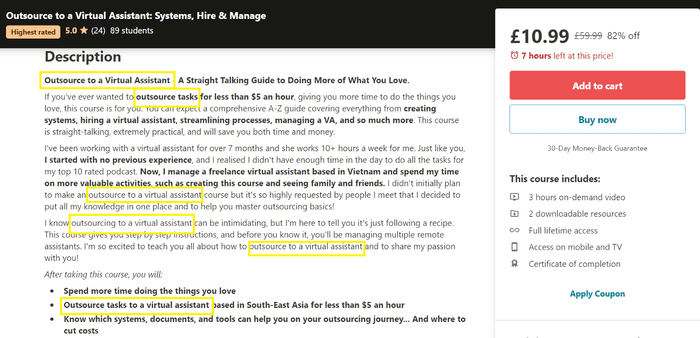
Where to find keywords?
On the Marketplace Insights report, you can find the most searched keywords.
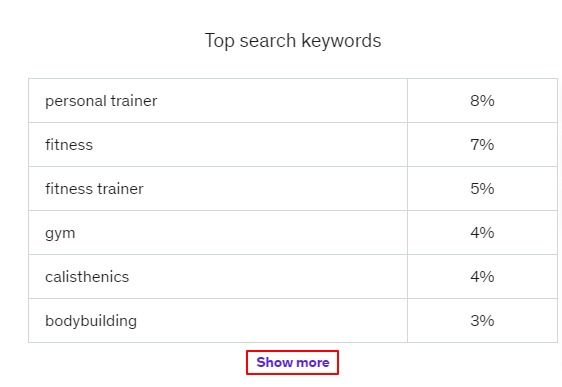
Using keywords will increase the chances of your course showing up in the search results.
Tip 12: Create a Free Course
Not sure how to sell a course on Udemy? Or if anyone will buy your first course?
Try building an audience first!
So how to build an audience before launching your first paid course?
Then simply launch a free course first!
Find this counterintuitive? Here is how it works.
By publishing a free course first, you remove the price barrier for your students to enroll in your course.
This way, you grow your audience and build trust. Such that when you launch a paid course - you'll have some people to enroll.
Creating a free course is less work, and you can even reuse existing material from your paid courses, and make a shorter version of it that is only an introduction to the main topic of the course.
According to the latest Udemy rules, a free course should have content of up to 2 hours maximum.

But that doesn’t mean you should compromise on quality - by the contrary.
Your course may be free, but it's an asset to make your first impression.
So, add as much value as you can in those 2 hours. The goal is to convince your students that your paid courses are the right choice for them.
Tip 13: Focus On Only One Niche
In the long term, you will make more sales if all your courses are as closely related as possible.
And this is because the students that bought one of your courses and liked them will very likely be interested in buying your other courses.
It's much easier to make repeated sales to existing customers, than it is to convert new visitors into customers.
So one sale turns into multiple sales, to the point where you will have many students that have purchased over time almost all your courses.
This way, Udemy will often encourage students to buy several of your courses using the suggested courses feature:
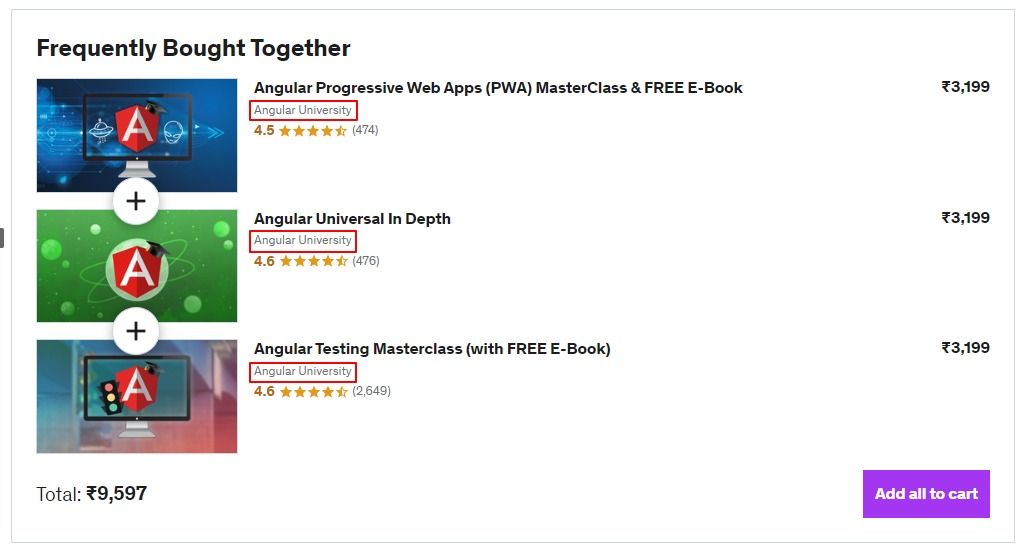
You'll notice that some of the most successful Udemy instructors have launched multiple courses in the same niche.
For example, Jose Portilla is a top instructor on Udemy and has launched 51 courses, most of them focused on one niche: Python.
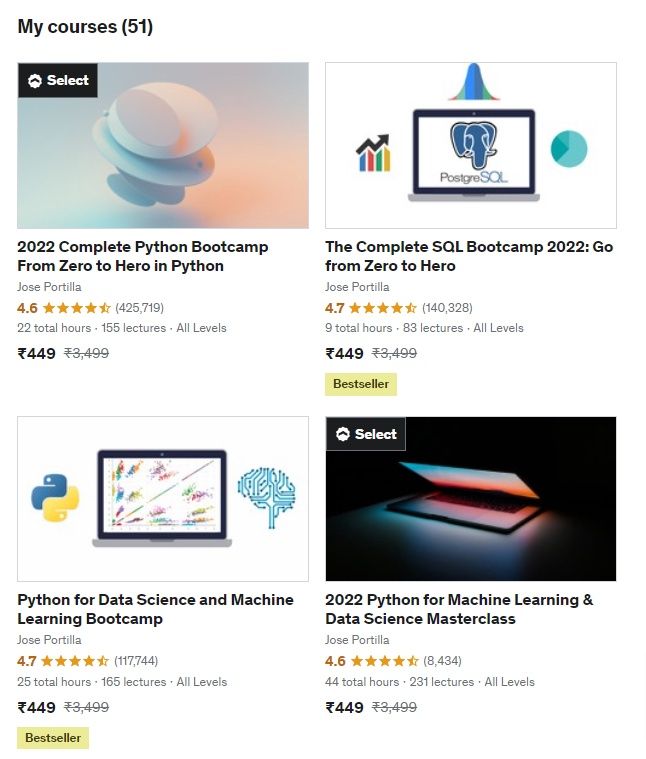
So if you want to build a long-term, consistent income from Udemy, focus on only one niche and launch multiple courses in closely related topics.
Tip 14: Improve Your Courses
The first version of your course is never going to be the best one. You will make mistakes, take too long to explain something, omit some important detail, gloss over a few things, etc.
Although it's tempting to just leave the course stand as it is and live with the current results, this is not the way to go in my view.
If you stay on the platform for a while, you will notice that top-ranking courses are updated quite frequently.
Such as this masterclass course on Python (ranking 2nd.)
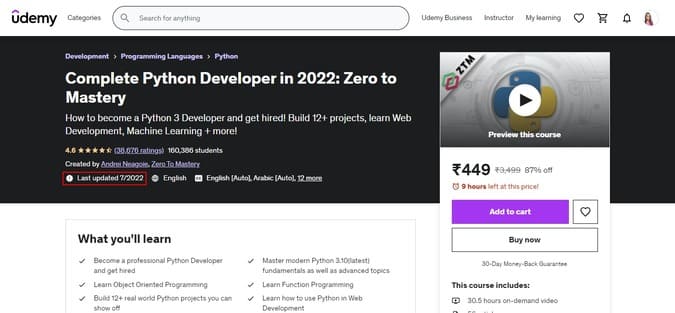
To improve your positions on search rankings, you need to update your courses with fresh information from time to time, or even re-shoot them completely if necessary.
In order to keep one of the top spots in several categories, I've actually reshot several courses more than once.
A couple of courses I've already filmed 3 times, and one of them I'm planning a 4th take in the near future.
This might not make sense for all course topics though.
In my case, as my field is software development, everything is constantly changing, so I'm sure I need to update my courses more often than instructors in other fields.
In all cases, whenever you send an updated version of an existing course, you will usually get a nice boost in sales, reviews and rankings, and you will ensure your course keeps doing well in the long term.
So my advice here is to not neglect a course just because it's selling well.
You want to make sure that you keep improving your courses over time, this will reflect itself in your sales sooner or later.
Conclusion: How to sell courses on Udemy
So these are my best tips to help you sell your courses on Udemy.
Udemy is a fantastic platform that is still growing strong. I publish my courses there, and recommend that you give it a shot too.
In a nutshell, the best ways for making money on Udemy are:
- try to create a masterclass
- if that is not possible go with niche courses
- make sure that you are enrolled in the Udemy Deals program and Udemy For Business.
Another thing that has also worked very well for me over the years to make revenue in general as a course creator, is to publish my courses also on my own website.
I've talked about it in detail here, if you want to know more about it: How I Made $1,615,000 Selling Online Courses (So Far).
I think you too should consider a mixed strategy where you publish your courses on marketplaces, as well as on your own website.
This works great for a lot of course creators, so it could also work great for you as well.
And to create a website where you can sell your courses freely, you need an easy-to-use online course hosting platform.
It is for this reason that I created OnlineCourseHost.com, a beginner-friendly and the most affordable course hosting platform you can find on the web.
The platform has everything you need to create and sell your online course.
With this platform you can launch unlimited courses, have as many students as you want, integrate Facebook Ads, customize your homepage, give out discount coupons, send email newsletters, and much more.
But more than a platform, we wanted to give you the information that you need to grow your online course business successfully.
That’s why we've created the Course Creator Academy where you can find everything you need to become a successful online course creator.
To get notified when new content is available here at the Academy, you can subscribe here to our weekly newsletter:
If you have any questions on online course creation, reach me on my Facebook group:
Join the Course Creator Academy Facebook Group
From here, I want you to follow these guides to learn more about online courses.
- Is Udemy worth it for Instructors?
- Udemy vs Skillshare: where to sell courses?
- How much do Udemy instructors make?
- Best Online Course Platforms (Ultimate Guide)
- How To Create An Online Course (In 15 Super-Practical Steps)
- How To Choose An Online Course Topic That Sells
- How To Record And Edit Your First Online Course
- Affordable Online Course Equipment - Complete Practical Guide
- The Ultimate Online Course Launch Checklist
I hope you found this post helpful, let me know in the comments below what other topics you'd like me to cover, or any questions that you have.
Thanks for reading… and enjoy the course creation process! 😉
Vasco Cavalheiro
OnlineCourseHost.com Founder & Online Course Creator








 Start Here
Start Here Course Creation Journey Step by Step
Course Creation Journey Step by Step  Course Creation Software Reviews
Course Creation Software Reviews Online Course Marketing
Online Course Marketing Course Creation Tips & Tricks
Course Creation Tips & Tricks Course Equipment
Course Equipment Online Course Marketplaces
Online Course Marketplaces Revenue Reports
Revenue Reports Best Practices
Best Practices Frequently Asked Questions
Frequently Asked Questions Platform Reviews
Platform Reviews